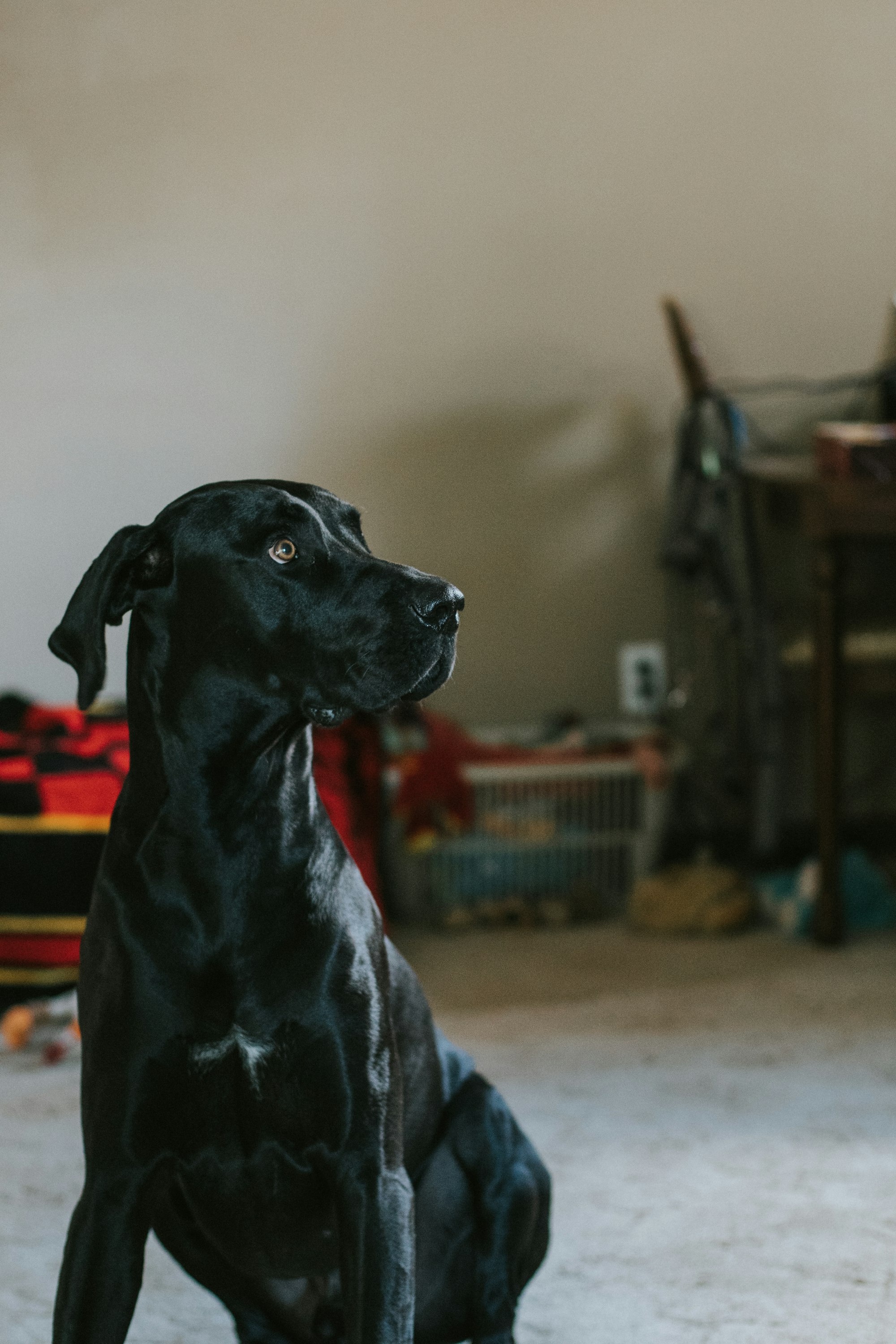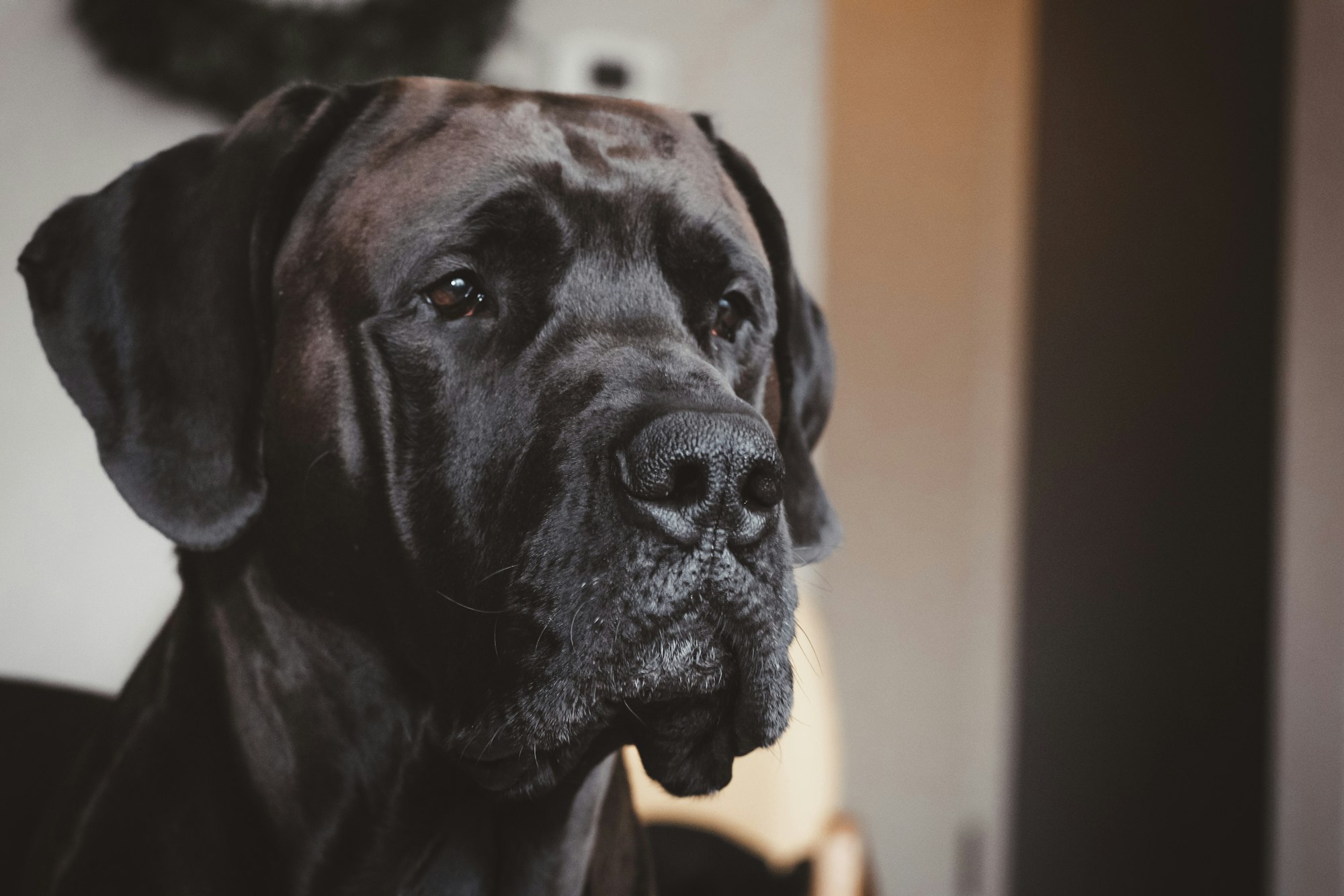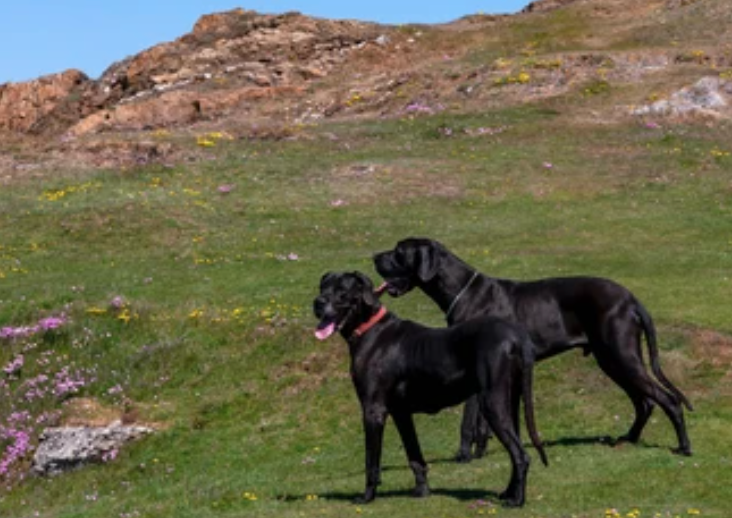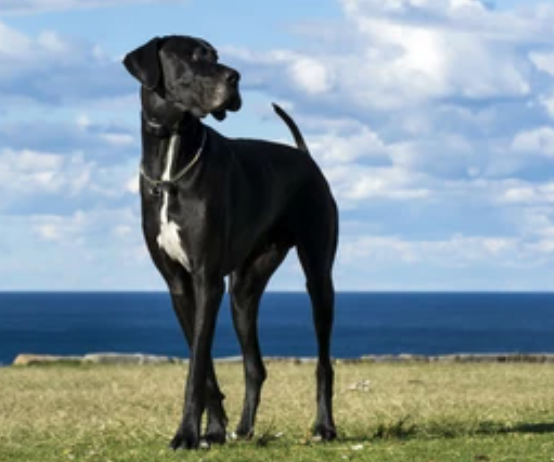Black Great Danes are a majestic and imposing breed that has captured the hearts of many dog lovers around the world. This breed is renowned for its size, strength, and beauty. In this article, we will explore the history, characteristics, care, and health issues of Black Great Danes. We will also discuss the training, socialization, and temperament of this breed, as well as the pros and cons of owning one.
History of the Black Great Dane
The Great Dane breed has a long and rich history that dates back to ancient times. The earliest known depictions of dogs resembling Great Danes can be found on Egyptian artifacts dating back to 3000 BC. However, the modern Great Dane, as we know it today, is believed to have originated in Germany in the 16th century.
The breed was initially used for hunting boar and deer, as well as for protection and as a status symbol among the nobility. They were also used as war dogs and were trained to fight alongside soldiers on the battlefield. Over time, the breed evolved into a more gentle and docile companion animal, and its popularity spread throughout Europe and eventually to the United States. Great Danes became especially popular in the United States in the 1950s and 1960s, and they continue to be a popular breed today.
Black Great Danes are a variation of the breed, and while their exact origins are unclear, it's believed that they may have originated from crosses with other breeds, such as the Newfoundland or the Mastiff. Today, Black Great Danes are a beloved variation of the breed, prized for their striking appearance and gentle demeanor.

Characteristics of Black Great Dane
Black Great Danes are large and powerful dogs with a striking appearance and gentle demeanor. Here are some of the key characteristics of Black Great Danes:
1· Size: Black Great Danes are one of the largest dog breeds, standing up to 32 inches tall at the shoulder and weighing up to 175 pounds.
2· Coat: Black Great Danes have a short, smooth coat that is shiny and easy to maintain. Their coat is usually black but may have small white markings on the chest or toes.
3· Temperament: Black Great Danes are known for their gentle and affectionate nature. They are loyal and loving companions that thrive on human companionship.
4· Intelligence: Black Great Danes are highly intelligent and trainable, but they can also be stubborn and independent at times.
5· Energy level: Black Great Danes have a moderate energy level and require daily exercise and mental stimulation to stay healthy and happy.
6· Health: Black Great Danes are prone to certain health issues, including hip dysplasia, bloat, heart disease, and cancer. Regular vet visits and proper care can help prevent and manage these health issues.
Overall, Black Great Danes are majestic and impressive dogs with a gentle temperament and loyal nature. They make wonderful pets for the right owner who is willing to provide them with the care and attention they need to thrive.
Grooming and Care
Black Great Danes are relatively easy to groom, but they do require regular care and attention to stay healthy and happy. Here are some tips for grooming and caring for a Black Great Dane:
1. Brush their coat regularly: Black Great Danes have short, smooth coat that is easy to maintain. However, they still require regular brushing to remove loose hair and keep their coat healthy and shiny.
2. Bathe them as needed: Black Great Danes don't require frequent baths, but they should be bathed as needed- to keep their coat clean and healthy. Use a gentle dog shampoo and be sure to rinse thoroughly.
3. Trim their nails: Black Great Danes have large, strong nails that can become overgrown if not trimmed regularly. Use a pair of dog nail clippers to trim their nails, being careful not to cut into the quick (the pink part of the nail). If your dog does not like them to be clipped, you can try using a Scratch Board.
4. Clean their ears: Black Great Danes are prone to ear infections, so it's important to keep their ears clean and dry. Use a cotton ball and ear cleaner to clean the inner side of their ears.
5. Exercise them daily: Black Great Danes require daily exercise to stay healthy and happy. Take them for walks, play games with them, and give them plenty of opportunities to run and play.
6. Feed them a healthy diet: Black Great Danes are prone to obesity, so it's essential to feed them a healthy, balanced diet that is appropriate for their age and activity level.
7. Take them to the vet regularly: Regular vet visits are necessary for monitoring your Black Great Dane's health and detecting any health issues early on. Be sure to keep up with their vaccinations, flea and tick prevention, and heartworm prevention.
By following these grooming and care tips, you can help ensure that your Black Great Dane stays healthy, happy, and well-groomed.

Nutrition and Feeding
Black Great Danes require proper feeding and nutrition to maintain their health and vitality. Feeding a Great Dane can be challenging due to their size and high energy requirements, but with accurate information and guidance, it can be easy to keep your furry friend well-fed and healthy.
A. Nutritional Needs
1. Protein
· Great Danes require a high-protein diet to maintain muscle mass and support growth and development.
· Look for dog foods that contain at least 25% protein and choose high-quality protein sources such as chicken, beef, or fish.
2. Fat
· Great Danes also need a significant amount of fat in their diet to provide energy and support healthy skin and coats.
· Look for dog foods that contain around 10-15% fat and choose healthy fat sources such as fish oil or chicken fat.
3. Carbohydrates
· Carbohydrates are a significant source of energy for Great Danes, but they should be limited to prevent weight gain.
· Look for dog foods that contain complex carbohydrates, such as sweet potatoes, brown rice, or barley.
4. Vitamins and Minerals
· Great Danes require a balanced blend of vitamins and minerals to support overall health and wellness.
· Look for dog foods that contain a variety of fruits and vegetables to provide essential vitamins and minerals.
B. Feeding Practices
1. Portion control
· Great Danes are prone to obesity, so it's important to control portion sizes to prevent overeating.
· Feed your Great Dane two to three small meals per day instead of one large meal.
2. Slow feeding
· Great Danes are also at risk of bloat, a life-threatening condition that can occur when they eat too quickly.
· Use a slow-feeding bowl or puzzle toys to encourage your Great Dane to eat more slowly and prevent bloat.
3. Hydration
· Great Danes require plenty of water to stay hydrated, especially during hot weather or exercise.
4· Provide them fresh water at all times and encourage your Great Dane to drink regularly.
By following these feeding and nutrition practices, you can help ensure that your Black Great Dane stays healthy and happy for years to come.
Health Issues and Concerns
Like all breeds, Black Great Danes are prone to certain health issues. Some most common health issues associated with this breed include hip dysplasia, bloat, heart disease, osteosarcoma, and eye problems. Regular visits to the vet and proper care can help prevent and manage these health issues.
1. Hip Dysplasia
Hip dysplasia is a common health issue in many large dog breeds, including Black Great Danes. It is a genetic condition that occurs when the hip joint does not develop properly, causing the bones to rub against each other. This can cause discomfort, pain, and even lameness. To prevent hip dysplasia, it is crucial to ensure that both parents of a Black Great Dane puppy have been screened for the condition. Additionally, keeping your dog at a healthy weight and providing them with regular exercise can help to prevent or manage symptoms.
2. Bloat
Bloat, also known as gastric torsion or twisted stomach, is a life-threatening condition that can affect Black Great Danes. It occurs when the stomach fills with gas, fluid, or food, and twists on itself, causing the blood supply to be cut off. Symptoms of bloat include a distended abdomen, restlessness, and difficulty breathing. If you suspect that your Black Great Dane may have bloat, it is required to seek veterinary care immediately. To prevent bloat, avoid feeding your dog large meals and ensure that they do not exercise vigorously after eating.
3. Dilated Cardiomyopathy
Dilated cardiomyopathy is a heart condition that affects some Black Great Danes. It occurs when the heart muscle becomes weak and enlarges, making it difficult for the heart to pump blood effectively. Symptoms of dilated cardiomyopathy can include coughing, fatigue, and difficulty breathing. To prevent dilated cardiomyopathy, it is necessary to feed your Black Great Dane a diet that is rich in nutrients and low in fillers. Regular exercise and routine veterinary check-ups can also help to prevent or manage symptoms.
4. Osteosarcoma
Osteosarcoma is a type of bone cancer that can affect Black Great Danes. It typically affects the leg bones and can cause pain, lameness, and swelling. Treatment options for osteosarcoma include amputation of the affected limb, chemotherapy, and radiation therapy. To prevent osteosarcoma, it is required to provide your Black Great Dane with a diet that is high in nutrients and low in carbohydrates. Regular exercise and routine veterinary check-ups can also help to prevent or manage symptoms.
5. Eye Problems
Black Great Danes can be prone to several eye problems, including cataracts, glaucoma, and progressive retinal atrophy. These conditions can cause vision loss, discomfort, and even blindness. To prevent eye problems, it is influential to ensure that your Black Great Dane receives routine eye exams and to provide them with a diet that is rich in antioxidants.

Training and Exercise for Black Great Danes
Training and exercise are crucial for Black Great Danes. They require a lot of physical activity to stay healthy and happy.
But always make sure to keep track of your pup, especially during training. You can use a Fi Smart Dog Collar to watch their location and keep track of daily exercise.
Training
Training is essential for all dogs, but it is especially important for Black Great Danes due to their size and strength. Proper training can help prevent destructive behavior, aggression, and anxiety. It can also help establish a strong bond between the dog and its owner.
Basic obedience training: Basic obedience training is the foundation of all training. It includes teaching the dog to sit, stay, come, and walk on a leash. Training should be done using positive reinforcement techniques such as treats, toys, and praise.
Socialization: Socialization is also significant for Black Great Danes. It involves exposing the dog to different people, animals, and environments to help it become well-adjusted and friendly. Socialization should begin early in a dog's life and should be ongoing.
Advanced training: Advanced training can include agility, obedience competitions, and even therapy dog training. These types of training can help keep the dog mentally stimulated and provide an opportunity for bonding with the owner.
Exercise
Black Great Danes are known for being relatively calm and low-energy dogs, but they still require daily exercise to stay healthy and happy.
Walks: Daily walks are a great way to provide exercise and mental stimulation for Black Great Danes. It is recommended to walk them at least once a day for 30-45 minutes.
Playtime: Black Great Danes enjoy playtime, especially with their owners. Playing fetch or tug-of-war can provide good exercise for both the dog and its owner.
Swimming: Swimming is also an excellent form of exercise for Black Great Danes, as it is low-impact and easy on their joints. It is required to supervise them when they are swimming and to introduce them to the water gradually.
Rest: Despite their large size, Black Great Danes are not highly energetic dogs and require plenty of rest. They should have a comfortable and quiet place to sleep and rest throughout the day.
Pros and Cons of Owning a Black Great Dane
Like any other breed, owning a Black Great Dane comes with its own set of pros and cons. In this section, we will discuss the advantages and disadvantages of owning a Black Great Dane.
Pros
1. Loyalty and Affection: Black Great Danes are extremely loyal and affectionate with their families. They make great companions and will always be by your side.
2. Size and Protection: The size and strength of Black Great Danes make them excellent guard dogs. They are capable of protecting their family and property from any potential threats.
3. Good with Children: Black Great Danes are gentle giants that are excellent with children. They are patient and loving with kids, making them great family pets.
4. Low Maintenance: Black Great Danes have a short coat that is easy to maintain. They require minimal grooming and are relatively low maintenance.
Cons
1. Health Issues: Black Great Danes are prone to specific health issues, including hip dysplasia, bloat, heart disease, and cancer. They require frequent vet check-ups and proper care to manage these health crises.
2. Training and Socialization: Black Great Danes need proper training and socialization to stop any behavioral issues. They are the wisest and need a firm and proficient owner to handle them properly.
3. Size and Space: Black Great Danes are one of the largest breeds of dogs. They require a lot of space to move around and exercise. Living in a small apartment or house may not be appropriate for this breed.
4. Cost: Black Great Danes are expensive to buy and maintain. They require a high-quality diet, regular vet visits, and other expenses that come with owning a large breed.
Therefore, owning a Black Great Dane can be a rewarding experience, but it requires a lot of dedication and responsibility. Prospective owners should carefully consider the pros and cons of this breed before committing.

Conclusion
In conclusion, black Great Danes are majestic and impressive dogs that make wonderful pets for the right owner. Their size and strength require careful consideration before adopting one, as they need proper care and attention to stay healthy and happy. However, with early socialization and training, black Great Danes can be gentle, affectionate, and loyal companions that will bring joy and love to any household. It's critical to do your research and understand the responsibilities of owning a Black Great Dane. With proper care and attention, a Black Great Dane can be a lifelong friend and companion.
Frequently Asked Questions
1. How long do Black Great Danes live?
· On average, Black Great Danes live between 7-10 years.
2. Are Black Great Danes good with children?
· Yes, Black Great Danes are gentle and patient with children, making them excellent family pets.
3. Do Black Great Danes require a lot of exercise?
· Yes, Black Great Danes require daily exercise to stay healthy and happy. They need plenty of space to move around and play.
4. Are Black Great Danes prone to any health issues?
· Yes, Black Great Danes are prone to distinct health issues, including hip dysplasia, bloat, heart disease, and cancer. Regular vet visits and proper care can help prevent and manage these health issues.
5. Are Black Great Danes easy to train?
· Black Great Danes are most intelligent and respond well to positive reinforcement training methods. However, they require proper training and socialization from a young age to prevent any behavioral issues.
Get more expert advice on pet-parenting by visiting the Off Leash blog at TryFi.com.
TryFi's The Fi Dog Collar is a must-have for any pet parent, it's a GPS tracking collar that helps you keep tabs on your dog's location, activity, and sleep patterns, and alerts you if they escape your backyard. Try the Fi Dog Collar today!

